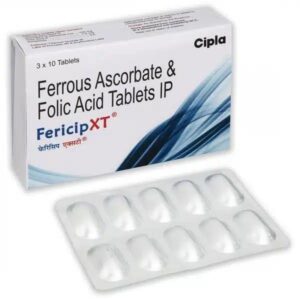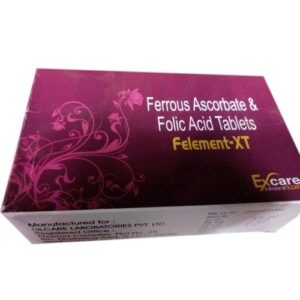FOLIC ACID. + FERROUS ASCORBATE
Folic Acid.: Drug name: Folic Acid
Use: Folic Acid is a vitamin that is essential for the production and maintenance of new cells in the body. It is commonly used to treat or prevent folic acid deficiency, which can occur in certain medical conditions such as anemia, pregnancy, kidney dialysis, and certain medications that affect its absorption.
Mechanism of action: Folic Acid works by helping the body produce and maintain new cells. It is necessary for DNA and RNA synthesis, as well as the metabolism of amino acids and certain neurotransmitters. It plays a crucial role in the formation of red blood cells, cell division, and protein synthesis.
Dose: The recommended daily dose of folic acid varies depending on the individual’s age, medical condition, and purpose of use. For adults, the typical dose ranges from 400 to 800 micrograms (mcg) per day. Higher doses may be prescribed for specific medical needs such as pregnancy or folic acid deficiency anemia. It is usually taken orally as a tablet or capsule, with or without food.
Side effects: Folic Acid is generally considered safe when taken at the recommended doses. However, some individuals may experience mild side effects such as nausea, loss of appetite, bloating, or a bitter taste in the mouth. These side effects are usually temporary and resolve on their own. In rare cases, allergic reactions may occur, which may include rash, itching, swelling, dizziness, or difficulty breathing. If any severe side effects or allergic reactions occur, medical attention should be sought immediately.
Note: Folic Acid supplements should not be used as a substitute for a balanced diet. It is always advisable to consult a healthcare professional before starting or changing any medication or supplement regimen.
Ferrous Ascorbate: Ferrous Ascorbate is a drug that combines iron and vitamin C. It is used as a dietary supplement to prevent or treat iron deficiency anemia. Iron deficiency anemia occurs when there is a lack of iron in the body, leading to reduced production of red blood cells and a subsequent decrease in oxygen-carrying capacity.
The mechanism of action of Ferrous Ascorbate involves the iron component. Iron is an essential mineral that is required for the synthesis of hemoglobin, the protein responsible for carrying oxygen in the red blood cells. By supplying iron, Ferrous Ascorbate helps in the production of hemoglobin, thereby improving the oxygen-carrying capacity of the blood.
The recommended dose of Ferrous Ascorbate may vary depending on the severity of iron deficiency anemia and an individual’s specific condition. It is typically taken orally, with or without food. Dosage instructions should be followed as prescribed by a healthcare professional.
Like any medication, Ferrous Ascorbate can have side effects. The most common side effects include nausea, constipation, diarrhea, stomach cramps, and stomach upset. These symptoms are usually mild and temporary. In some cases, Ferrous Ascorbate may cause more serious side effects such as allergic reactions or severe gastrointestinal problems. It is important to consult a healthcare professional if any adverse reactions occur.
Individuals who are allergic to iron or any other components of Ferrous Ascorbate should not use this drug. Additionally, certain medical conditions such as hemochromatosis, thalassemia, or other forms of anemia may require caution or adjusted dosage when using this medication. It is always advisable to consult with a healthcare professional before starting or modifying any medication regimen.


